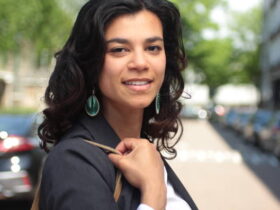Dr. Lilly Jay was once mostly known within clinical circles — a perinatal psychologist focused on the early emotional lives of parents and children. But since late 2023 and into 2024, she has become a more visible figure. Through her candid writing, she’s sharing how life, identity, therapy, parenting, and heartbreak intersect under public scrutiny. Here’s a fresh look at Lilly Jay’s story: who she is, what she’s shared recently, and why it matters.
Who Is Lilly Jay?
-
Professional Background: Lilly Jay is a licensed clinical psychologist specializing in perinatal mental health, child development, and attachment. Her clinical training and work have centered on supporting new mothers, mental health during pregnancy, and the emotional transitions involved in early parenthood. Glamour+2Distractify+2
-
Personal Life: She married actor Ethan Slater in 2018; the two were high school sweethearts. Their son was born in August 2022. Their relationship later ended; they separated in 2023 and formalized their divorce in September 2024. Philstar Life+4People.com+4People.com+4
What Happened: Lilly Jay’s Recent Revelations
The Essay That Changed the Narrative
In December 2024, Lilly Jay published a powerful personal essay titled “How Does My Divorce Make You Feel?” in The Cut. In it, she reflected on:
-
The emotional shock of the divorce, particularly coming just after childbirth. Distractify+2The News International+2
-
Her experience with a life-threatening birth complication (preeclampsia) and the vulnerability of new motherhood. E! Online+2Philstar Life+2
-
How her professional identity as a psychologist has been impacted by the publicity surrounding her divorce. She wrote about missing her private life and the “invisibility” she once had. Philstar Life+2Distractify+2
Co-Parenting Amid Public Spotlight
Despite the personal turmoil, Lilly Jay stresses that co-parenting remains central. She and Ethan Slater share custody of their young son and, although their partnership has changed, their parenthood has not. She speaks of loving her son “100 percent of the time” regardless of how parenting duties are divided. People.com+2Elite Daily+2
The Public vs Private Conflict
One of Lilly Jay’s most discussed themes is the tension between her role as a psychologist — a role that often demands confidentiality and privacy — and being unwillingly thrust into public visibility. Some key points:
-
She recalls deactivating her Facebook around age 18 to reduce public persona and maintain privacy. Distractify+1
-
She describes feeling haunted by media cycles: promotions for Wicked (a movie her ex-partner is involved in) becoming symbols of darker days for her. Elite Daily+2Distractify+2
-
She noted professional consequences: job offers falling through, patients canceling, opportunities dissolving, possibly due to tabloid coverage. E! Online+2Distractify+2
Themes Emerging from Lilly Jay’s Story
1. Maternal Mental Health & Vulnerability
Lilly Jay’s narrative underscores how motherhood, birth complications, and postpartum life are deeply vulnerable phases. Her story draws attention to the mental and emotional risks many mothers face but few talk about publicly. Philstar Life+3Glamour+3E! Online+3
2. Privacy, Identity, and Visibility
For someone whose professional success depends on being a safe, partly anonymous space for others, visibility can feel both powerful and painful. Lilly Jay is exploring how to reconcile being known in tabloids with being known in therapy rooms. Philstar Life+2E! Online+2
3. Public Divorce, Private Pain
Her divorce became a public affair largely because of her ex-husband’s rising celebrity profile and new romantic relationship. Jay’s reflections reveal how deeply public attention can intrude upon private anguish, especially when one partner is in the limelight. EW.com+2Philstar Life+2
4. Resilience & Reframing
Despite everything, Lilly Jay speaks not just of loss but also of possibility. She speaks of constructing a new life, of motherhood that continues with love, and of accepting visibility as something she might use — perhaps to offer connection, or to be more fully herself. Philstar Life+2Elite Daily+2
Why Lilly Jay’s Story Resonates
-
Relatability for many parents: Her story reflects big issues — postpartum challenges, career vs family, identity changes — that aren’t unique to celebrities.
-
Bridging clinical insight & lived experience: Because she is a trained psychologist, her reflections include not only what many feel but also what many clinicians know, often in more academic or private settings.
-
Mental health advocacy: Her willingness to speak up brings attention to perinatal mental health, postpartum complications, and how societal expectations often leave mothers isolated.
-
Reclaiming voice: Amid narratives that might reduce her to “the wronged ex,” she authors a version of truth that isn’t passive victimhood.
Current Status & What Lilly Jay Is Doing Now
-
Co-Parenting: She and Slater are working through sharing parenting responsibilities, maintaining mutual love for their son despite the divorce. People.com+1
-
Professional Boundaries: She remains active in her clinical practice, but her recent experiences are shifting how she thinks about her professional boundaries, public exposure, and how much of self she wants people to see. Philstar Life+1
-
Advocacy & Writing: Lilly Jay has joined public conversations about maternal mental health care, societal expectations around motherhood, and how to treat mental health in perinatal stages. She has also joined boards and platforms (such as Riley, per recent reporting) that aim to provide credible parenting support. Glamour
What We Can Learn From Lilly Jay
-
It’s okay to be human in public
Jay’s story shows that mental health professionals are not immune to pain, vulnerability, or confusion — and that sharing parts of that can create connection. -
Boundaries matter, but they can shift
What privacy you want, what role you carry, what exposure you accept — these are personal decisions, and life events can force re-evaluations. -
Identity isn’t singular
Lilly Jay is mother, psychologist, partner (ex-partner), public figure (to some extent), private person. She juggles these selves. We all do in our own ways. -
Voice is powerful
Writing that essay was not just cathartic; it reframes the narrative: she defines some of her story rather than letting others tell it for her. -
Resilience in action doesn’t mean absence of pain
She speaks honestly about days that are dark, yet chooses to believe there is possibility and sweetness ahead. Healing isn’t linear, but it’s still possible.
The Significance: Why Lilly Jay’s Journey Is Relevant Now
-
With increased focus globally on mental health, especially parental mental health, her reflections are timely.
-
Media scrutiny, social media visibility, and celebrity culture often magnify personal suffering; Jay’s story points to what often remains unseen — inner conflict, loss, invisibility, fear.
-
Her experience raises questions about how we support mothers physically and emotionally after childbirth.
-
Additionally, she models how someone can respond with dignity, reflection, and agency when life takes unexpected turns.
Challenges Ahead & Possible Futures
-
She may continue to deal with unwanted media attention. Even a single public story can linger, influence perceptions, affect trust, or influence career trajectories.
-
Balancing visibility and privacy will likely remain an ongoing tension.
-
Maintaining her professional identity (as psychologist) while being known in broader culture may require new forms of transparency or self-care.
-
Her potential to influence policy, parental support networks, or attitudes about postpartum care is strong — many are watching to see how she uses her voice in future writing, advocacy, or institutional engagement.
Conclusion
Lilly Jay is not just a name angled into gossip—she is a person with deep professional training, serious responsibilities, heartbreak, and vision. Her recent journey from privacy to public reflection offers lessons in empathy, in self-definition, and in how even when life goes differently than planned, there can be growth. For many, her story feels raw, relevant, and hopeful.
As of now, Lilly Jay continues to co-parent, continues to be a psychologist, and continues to write. Her next actions — whether essays, advocacy, or simply living — matter not only for her own path but for many who see in her a mirror of their own joys and pains.








Leave a Reply